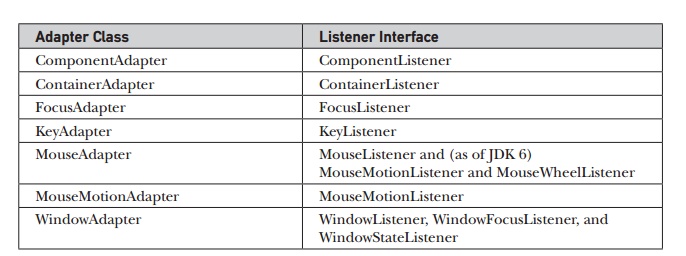Chapter: Java The Complete Reference : The Java Library : Event Handling
Adapter Classes - Java
Adapter Classes
Java provides a special feature, called an adapter class, that can simplify the creation of event handlers in
certain situations. An adapter class provides an empty implementation of all
methods in an event listener interface. Adapter classes are useful when you
want to receive and process only some of the events that are handled by a
particular event listener interface. You can define a new class to act as an
event listener by extending one of the adapter classes and implementing only
those events in which you are interested.
For example, the MouseMotionAdapter
class has two methods, mouseDragged( )
and mouseMoved( ), which are the
methods defined by the
MouseMotionListener interface. If you
were interested in only mouse drag events, then you could simply extend MouseMotionAdapter and override mouseDragged( ). The empty
implementation of mouseMoved( )
would handle the mouse motion events for you.
Table 24-4 lists several commonly used adapter classes in java.awt.event and notes the interface
that each implements.
Adapter Class : Listener
Interface
ComponentAdapter : ComponentListener
ContainerAdapter :
ContainerListener
FocusAdapter : FocusListener
KeyAdapter : KeyListener
MouseAdapter : MouseListener
and (as of JDK 6) MouseMotionListener and MouseWheelListener
MouseMotionAdapter :
MouseMotionListener
WindowAdapter : WindowListener,
WindowFocusListener, and WindowStateListener

Table 24-4 Commonly Used Listener Interfaces Implemented
by Adapter Classes
The following example demonstrates an adapter. It displays a
message in the status bar of an applet viewer or browser when the mouse is
clicked or dragged. However, all other mouse events are silently ignored. The
program has three classes. AdapterDemo
extends Applet. Its init( ) method creates an instance of MyMouseAdapter and registers that
object to receive notifications of
mouse events. It also creates an instance of MyMouseMotionAdapter and registers that object to receive
notifications of mouse motion events. Both of the constructors take a reference
to the applet as an argument.
MyMouseAdapter extends MouseAdapter and overrides the
mouseClicked( ) method. The
other mouse events are silently ignored by code inherited from the MouseAdapter class. MyMouseMotionAdapter extends MouseMotionAdapter and overrides the mouseDragged( ) method. The other mouse
motion event is silently ignored by code
inherited from the MouseMotionAdapter
class. (MouseAdaptor also provides
an empty implementation for MouseMotionListener.
However, for the sake of illustration, this example handles each separately.)
Note that both of the event listener classes save a reference to
the applet. This information is provided as an argument to their constructors
and is used later to invoke the showStatus(
) method.
//
Demonstrate an adapter.
import
java.awt.*;
import
java.awt.event.*; import java.applet.*; /*
<applet
code="AdapterDemo" width=300 height=100> </applet>
*/
public
class AdapterDemo extends Applet { public void init() {
addMouseListener(new
MyMouseAdapter(this));
addMouseMotionListener(new
MyMouseMotionAdapter(this));
}
}
class
MyMouseAdapter extends MouseAdapter {
AdapterDemo
adapterDemo;
public
MyMouseAdapter(AdapterDemo adapterDemo) { this.adapterDemo = adapterDemo;
}
//
Handle mouse clicked.
public
void mouseClicked(MouseEvent me) { adapterDemo.showStatus("Mouse clicked");
}
}
class
MyMouseMotionAdapter extends MouseMotionAdapter {
AdapterDemo
adapterDemo;
public
MyMouseMotionAdapter(AdapterDemo adapterDemo) {
this.adapterDemo
= adapterDemo;
}
//
Handle mouse dragged.
public
void mouseDragged(MouseEvent me) {
adapterDemo.showStatus("Mouse
dragged");
}
}
As you can see by looking at the program, not having to implement
all of the methods defined by the MouseMotionListener
and MouseListener interfaces saves
you a considerable amount of effort and prevents your code from becoming
cluttered with empty methods. As an exercise, you might want to try rewriting
one of the keyboard input examples shown earlier so that it uses a KeyAdapter.
Related Topics